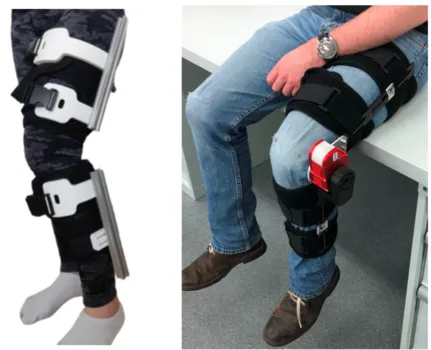SMILE – Sensory Motor Interface for Lower Extremity Exoskeletons
Development of Lower Extremity Exoskeletons (LEEs) customized for individual patients, specifically tailored to their physiological and clinical needs.
Project Partners
Imperial College of London
Duration
01.10.2020 – 30.09.2024
Funding authority
TUM International Graduate School of Science and Engineering (IGSSE)
Motivation
Loss of mobility or balance resulting from neural trauma or aging is a critical consideration in public health. Wearable robots (i.e. exoskeletons) are recognized as solutions for rehabilitation and assisted motion. Although research in exoskeletons is extensive, two obstacles have impeded full realization of exoskeletons: power/weight ratio of the exoskeleton structure and machine intelligence enabling adaption to specific patient. The project aims to develop a fully automated framework from the topology optimization of the structural parts to a robot-based rapid prototyping in order to produce customized LEE for stroke patients in less than 24 hours.
Method
In order to develop an exoskeleton that is specifically tailored for individual patients, both fabrication of the topology and functionality optimized LEE structures (i.e. optimizing power/weight ratio) and artificial intelligence for smooth human-machine interface are needed. The customization of the geometry combined with the customization of the stiffness is a challenge that will be tackled in this project. This will be realized with the use of dedicated topology optimization algorithms tailored to robot-based rapid prototyping processes with local fiber reinforcement. As a result, customized lightweight parts can be manufactured in a fully automated process. Moreover, machine learning algorithms will be used to derive design parameters for each user based on simulations of walking constrained by the patient’s medical needs. This enables neuro-mechanics of joint stiffness, size, weight, and sensor placement to be customized for an optimal use.
Acknowledgement
The chair thankfully acknowledges the funding supported by the TUM International Graduate School of Science and Engineering (IGSSE) through the Joint Academy of Doctoral Studies (JADS) program.

News
23.08.2021 Multi-functional non-planar 3D printed parts with embedded copper wire
30.04.2021 Nonplanar 3D printing with continuous carbon fiber
27.10.2020 SMILE: Sensory Motor Interface for Lower Extremity Exoskeletons
Contact Persons
Chih-Yu Chen, M.Sc.; Dr.-Ing. Swen Zaremba
